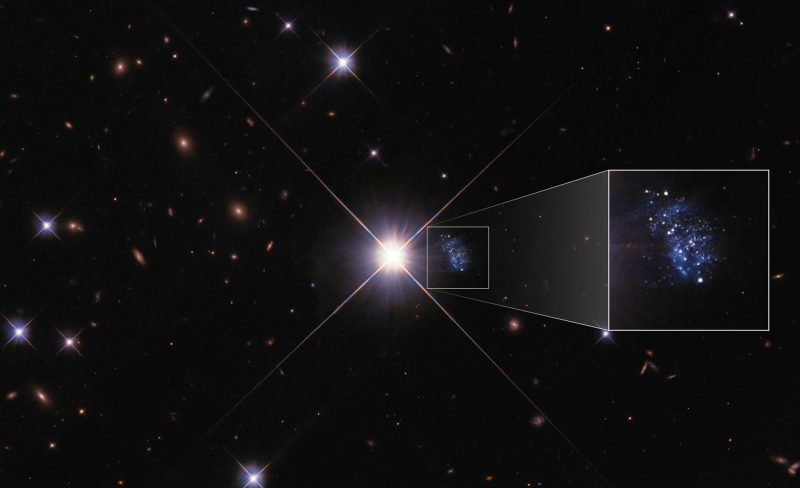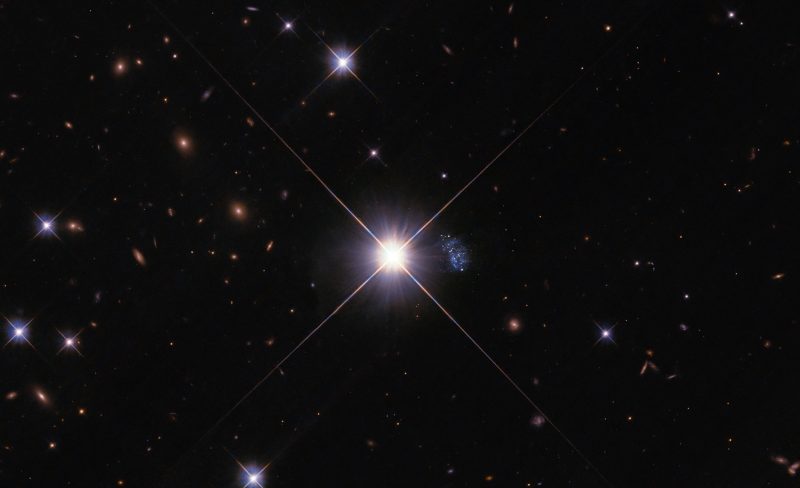Originally published by NASA on December 6, 2022. Edits by EarthSky.
Peekaboo Galaxy emerges from behind star
Astronomers said in December, 2022 that they’ve found a bit galaxy peeking out from behind the glare of a brilliant foreground star. At 20 million light-years from Earth, the Peekaboo Galaxy is comparatively close by. However it has traits extra like galaxies within the distant, early universe. Just one,200 light-years throughout – in distinction to 100,000 light-years for our residence galaxy, the Milky Way – the tiny galaxy HIPASS J1131–31 bought the nickname Peekaboo due to its emergence up to now 50-100 years from behind a fast-moving star that beforehand had obscured it from view.
The invention is a mixed effort of telescopes on the bottom and in space. That features affirmation by NASA’s Hubble Space Telescope. Collectively, the analysis reveals tantalizing proof that the Peekaboo Galaxy is the closest instance of the galaxy formation processes that generally befell not lengthy after the Big Bang, 13.8 billion years in the past.
Gagandeep Anand of the Area Telescope Science Institute in Baltimore, Maryland, was co-author of the brand new research on Peekaboo’s intriguing properties. He mentioned:
Uncovering the Peekaboo Galaxy is like discovering a direct window into the previous, permitting us to check its excessive setting and stars at a stage of element that’s inaccessible within the distant, early universe.
The Month-to-month Notices of the Royal Astronomical Society have accepted the outcomes for publication.
An especially metal-poor galaxy
Astronomers describe galaxies like Peekaboo as extraordinarily metal-poor (XMP). In astronomy, metals refers to all components heavier than hydrogen and helium. The very early universe was virtually completely made up of primordial hydrogen and helium, components solid within the Large Bang. Stars forged heavier components over the course of cosmic historical past, constructing as much as the widely metal-rich universe we discover ourselves in at present. Life as we all know it consists of heavier ingredient constructing blocks like carbon, oxygen, iron and calcium.
Whereas the universe’s earliest galaxies had been XMP by default, astronomers have additionally discovered equally metal-poor galaxies in the local universe. Peekaboo caught astronomers’ consideration as a result of not solely is it an XMP galaxy and not using a substantial older stellar inhabitants, however at solely 20 million light-years from Earth, it’s at the very least half the gap of the beforehand recognized younger XMP galaxies.
Discovery of the Peekaboo Galaxy
Bärbel Koribalski first detected Peekaboo as a area of chilly hydrogen. That was greater than 20 years in the past with the Australian Parkes radio telescope Murriyang, within the HI Parkes All Sky Survey. Koribalski is an astronomer at Australia’s nationwide science company CSIRO and a co-author of the newest analysis research on Peekaboo’s metallicity. NASA’s space-based Galaxy Evolution Explorer mission’s far-ultraviolet observations confirmed it to be a compact blue dwarf galaxy. Koribalski mentioned:
At first we didn’t notice how particular this little galaxy is. Now with mixed knowledge from the Hubble Area Telescope, the Southern African Giant Telescope (SALT), and others, we all know that the Peekaboo Galaxy is likely one of the most metal-poor galaxies ever detected.
A better take a look at the galaxy
NASA’s Hubble Area Telescope was in a position to resolve about 60 stars within the tiny galaxy. Virtually all the celebrities seem like a couple of billion years previous or youthful. To finish the image, SALT took measurements of Peekaboo’s metallicity. Collectively, these findings underline the key distinction between Peekaboo and different galaxies within the native universe. Galaxies within the native universe sometimes have historical stars which might be many billions of years previous. Peekaboo’s stars point out that it is likely one of the youngest and least chemically enriched galaxies ever detected within the native universe. That is very uncommon, because the native universe has had about 13 billion years of cosmic historical past to develop.
Nonetheless, the image remains to be a shallow one. Anand defined the Hubble observations had been made as a part of a “snapshot” survey program referred to as The Each Identified Close by Galaxy Survey. This survey is an effort to get Hubble knowledge of as many neighboring galaxies as doable. The analysis staff plans to make use of Hubble and the James Webb Space Telescope to do additional analysis on Peekaboo. They hope to study extra about its stellar populations and their metal-makeup. Anand mentioned:
As a consequence of Peekaboo’s proximity to us, we will conduct detailed observations, opening up prospects of seeing an setting resembling the early universe in unprecedented element.

Backside line: The Peekaboo Galaxy, found after rising from behind a fast-moving star, has a particularly low quantity of steel, but its distance isn’t as far within the universe as astronomers would anticipate.




